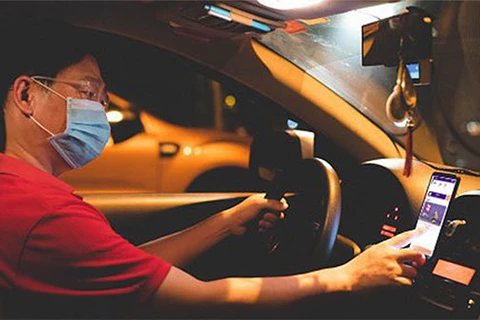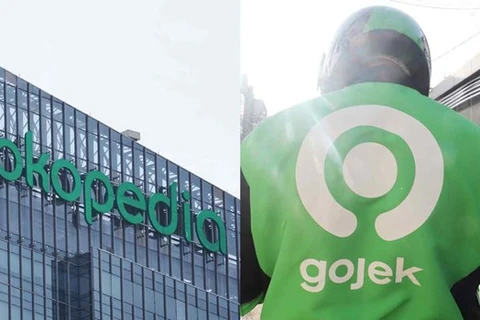Hanoi (VNA) - The Indonesian-based Gojek will launch car-hailing and e-payments in Vietnam this year, which Grab and the Be Group have offered for a couple of years already.
“We have obtained a licence for the passenger transport business by motor car under contract in Ho Chi Minh City, and we are rushing to add our car-hailing service, called GoCar, in Vietnam,” said Gojek Vietnam Director Phung Tuan Duc.
It is a suitable time for Gojek to introduce its car-hailing service, he went on, having laid a solid foundation and developed its ecosystem.
Its ecosystem includes motorbike rides (Gojek), goods delivery (GoSend), and food delivery (GoFood), he explained, adding that it is connected to more than 200,000 drivers and dozens of restaurants with millions of customers.
The GoCar service will be conducted in HCM City initially and then in Hanoi, and will become available in many other cities once Gojek has posted strong development in the two cities.
Vietnam is a large market and will enjoy robust growth. COVID-19 has presented an opportunity for the digital economy in Vietnam and the region as a whole to develop.
According to a report from Google and Temasek in 2020, one in every three residents has used digital services since COVID-19 first struck, and 94 percent of these intend to use such services after the pandemic ends.
“It is not important whether you are a first-comer or a latecomer,” Duc said. “The ride-hailing market will continue to flourish, with a lot of space for different players.”
Recent research by global market advisory firm ABI Research found that Grab remains the dominant player in Vietnam’s ride-hailing market, with a 74.6 percent market share. Competitors Be accounted for 12.4 percent and Gojek 12.3 percent, with the remainder held by FastGo, MGo, Vato, viApp, and GV Taxi.
Analysts said the ride-hailing playground now belongs to Grab, GoJek, and Be, who compete in finance and technology.
According to Duc, technology is the most important “weapon”.
“Preeminent technology is the key to GoJek’s success in the past ten years, and will drive the company’s achievements in the future,” he stressed.
Meanwhile, Nguyen Thai Hai Van, CEO of Grab Vietnam, said the ride-hailing app’s quality is its competitive weapon, adding that it is necessary to offer customers and partners a good experience and excellent products.
Nguyen Hoang Phuong, CEO of Be, the biggest domestic player, said the company has a different approach to the ride-hailing market.
Be has developed itself into a mobile service provider, allowing users to plan and make payments for various services on one platform./.
“We have obtained a licence for the passenger transport business by motor car under contract in Ho Chi Minh City, and we are rushing to add our car-hailing service, called GoCar, in Vietnam,” said Gojek Vietnam Director Phung Tuan Duc.
It is a suitable time for Gojek to introduce its car-hailing service, he went on, having laid a solid foundation and developed its ecosystem.
Its ecosystem includes motorbike rides (Gojek), goods delivery (GoSend), and food delivery (GoFood), he explained, adding that it is connected to more than 200,000 drivers and dozens of restaurants with millions of customers.
The GoCar service will be conducted in HCM City initially and then in Hanoi, and will become available in many other cities once Gojek has posted strong development in the two cities.
Vietnam is a large market and will enjoy robust growth. COVID-19 has presented an opportunity for the digital economy in Vietnam and the region as a whole to develop.
According to a report from Google and Temasek in 2020, one in every three residents has used digital services since COVID-19 first struck, and 94 percent of these intend to use such services after the pandemic ends.
“It is not important whether you are a first-comer or a latecomer,” Duc said. “The ride-hailing market will continue to flourish, with a lot of space for different players.”
Recent research by global market advisory firm ABI Research found that Grab remains the dominant player in Vietnam’s ride-hailing market, with a 74.6 percent market share. Competitors Be accounted for 12.4 percent and Gojek 12.3 percent, with the remainder held by FastGo, MGo, Vato, viApp, and GV Taxi.
Analysts said the ride-hailing playground now belongs to Grab, GoJek, and Be, who compete in finance and technology.
According to Duc, technology is the most important “weapon”.
“Preeminent technology is the key to GoJek’s success in the past ten years, and will drive the company’s achievements in the future,” he stressed.
Meanwhile, Nguyen Thai Hai Van, CEO of Grab Vietnam, said the ride-hailing app’s quality is its competitive weapon, adding that it is necessary to offer customers and partners a good experience and excellent products.
Nguyen Hoang Phuong, CEO of Be, the biggest domestic player, said the company has a different approach to the ride-hailing market.
Be has developed itself into a mobile service provider, allowing users to plan and make payments for various services on one platform./.
VNA
























